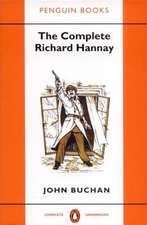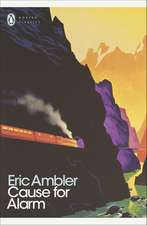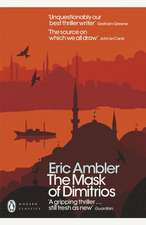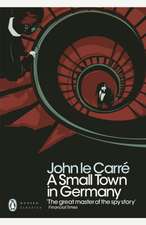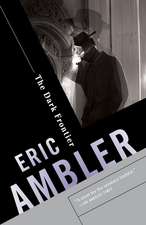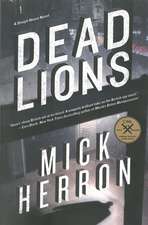Journey into Fear: Penguin Modern Classics
Autor Eric Ambler Introducere de Norman Stoneen Limba Engleză Paperback – 27 mai 2009
| Toate formatele și edițiile | Preț | Express |
|---|---|---|
| Paperback (3) | 52.26 lei 22-33 zile | +17.58 lei 6-12 zile |
| Penguin Books – 27 mai 2009 | 52.26 lei 22-33 zile | +17.58 lei 6-12 zile |
| Penguin Books – 12 iul 2023 | 52.49 lei 22-33 zile | +17.98 lei 6-12 zile |
| Vintage Crime/Black Lizard – 30 noi 2002 | 100.76 lei 3-5 săpt. |
Din seria Penguin Modern Classics
- 17%
 Preț: 41.41 lei
Preț: 41.41 lei -
 Preț: 82.90 lei
Preț: 82.90 lei -
 Preț: 80.98 lei
Preț: 80.98 lei - 15%
 Preț: 48.87 lei
Preț: 48.87 lei - 17%
 Preț: 52.07 lei
Preț: 52.07 lei - 19%
 Preț: 59.39 lei
Preț: 59.39 lei - 18%
 Preț: 46.05 lei
Preț: 46.05 lei - 17%
 Preț: 52.49 lei
Preț: 52.49 lei -
 Preț: 69.06 lei
Preț: 69.06 lei - 16%
 Preț: 58.66 lei
Preț: 58.66 lei - 17%
 Preț: 51.67 lei
Preț: 51.67 lei -
 Preț: 81.84 lei
Preț: 81.84 lei - 18%
 Preț: 46.25 lei
Preț: 46.25 lei -
 Preț: 97.20 lei
Preț: 97.20 lei - 17%
 Preț: 52.33 lei
Preț: 52.33 lei - 15%
 Preț: 48.90 lei
Preț: 48.90 lei - 16%
 Preț: 53.55 lei
Preț: 53.55 lei - 18%
 Preț: 51.39 lei
Preț: 51.39 lei -
 Preț: 63.28 lei
Preț: 63.28 lei - 16%
 Preț: 53.93 lei
Preț: 53.93 lei - 18%
 Preț: 51.00 lei
Preț: 51.00 lei - 15%
 Preț: 49.40 lei
Preț: 49.40 lei - 15%
 Preț: 55.26 lei
Preț: 55.26 lei - 16%
 Preț: 48.30 lei
Preț: 48.30 lei - 17%
 Preț: 52.10 lei
Preț: 52.10 lei -
 Preț: 81.61 lei
Preț: 81.61 lei - 17%
 Preț: 68.49 lei
Preț: 68.49 lei - 18%
 Preț: 46.25 lei
Preț: 46.25 lei - 18%
 Preț: 46.02 lei
Preț: 46.02 lei - 16%
 Preț: 42.26 lei
Preț: 42.26 lei - 17%
 Preț: 51.66 lei
Preț: 51.66 lei - 16%
 Preț: 48.45 lei
Preț: 48.45 lei - 17%
 Preț: 42.01 lei
Preț: 42.01 lei - 15%
 Preț: 54.63 lei
Preț: 54.63 lei - 18%
 Preț: 46.31 lei
Preț: 46.31 lei - 18%
 Preț: 46.31 lei
Preț: 46.31 lei - 16%
 Preț: 53.59 lei
Preț: 53.59 lei - 16%
 Preț: 53.11 lei
Preț: 53.11 lei -
 Preț: 95.04 lei
Preț: 95.04 lei - 16%
 Preț: 79.93 lei
Preț: 79.93 lei - 18%
 Preț: 46.02 lei
Preț: 46.02 lei - 16%
 Preț: 68.94 lei
Preț: 68.94 lei -
 Preț: 81.35 lei
Preț: 81.35 lei - 17%
 Preț: 51.60 lei
Preț: 51.60 lei - 18%
 Preț: 51.38 lei
Preț: 51.38 lei - 16%
 Preț: 53.36 lei
Preț: 53.36 lei - 18%
 Preț: 50.73 lei
Preț: 50.73 lei - 16%
 Preț: 48.46 lei
Preț: 48.46 lei - 16%
 Preț: 53.37 lei
Preț: 53.37 lei - 17%
 Preț: 52.33 lei
Preț: 52.33 lei
Preț: 52.26 lei
Preț vechi: 62.92 lei
-17% Nou
Puncte Express: 78
Preț estimativ în valută:
10.00€ • 10.69$ • 8.34£
10.00€ • 10.69$ • 8.34£
Carte disponibilă
Livrare economică 28 martie-08 aprilie
Livrare express 12-18 martie pentru 27.57 lei
Preluare comenzi: 021 569.72.76
Specificații
ISBN-13: 9780141190303
ISBN-10: 0141190302
Pagini: 224
Ilustrații: no illustrations
Dimensiuni: 129 x 198 x 13 mm
Greutate: 0.17 kg
Editura: Penguin Books
Colecția Penguin Classics
Seria Penguin Modern Classics
Locul publicării:London, United Kingdom
ISBN-10: 0141190302
Pagini: 224
Ilustrații: no illustrations
Dimensiuni: 129 x 198 x 13 mm
Greutate: 0.17 kg
Editura: Penguin Books
Colecția Penguin Classics
Seria Penguin Modern Classics
Locul publicării:London, United Kingdom
Notă biografică
Eric Ambler (1909-98) was born in London to parents who were part-time entertainers. He studied engineering but left college without taking a degree and became a copywriter in the advertising industry. Between 1937 and 1940, he published his great anti-fascist spy thrillers: Uncommon Danger, Epitaph for a Spy, Cause for Alarm, The Mask of Dimitrios, and Journey into Fear. In 1940, he joined the Royal Artillery and was later transferred to the army film unit. After the war he worked as a screenwriter in England and Hollywood and married his second wife, a leading Hollywood producer. Ambler's post-war novels include Passage of Arms, The Light of Day and A Kind of Anger, and his profound influence on the genre has been acknowledged by writers including Graham Greene, Ian Fleming and John le Carré.
Extras
CHAPTER ONE
THE STEAMER, Sestri Levante, stood high above the dock side, and the watery sleet, carried on the wind blustering down from the Black Sea, had drenched even the small shelter deck. In the after well the Turkish stevedores, with sacking tied round their shoulders, were still loading cargo.
Graham saw the steward carry his suit-case through a door marked PASSEGGIERI, and turned aside to see if the two men who had shaken hands with him at the foot of the gangway were still there. They had not come aboard lest the uniform of one of them should draw attention to him. Now they were walking away across the crane lines towards the warehouses and the dock gates beyond. As they reached the shelter of the first shed they looked back. He raised his left arm and saw an answering wave. They walked on out of sight.
For a moment he stood there shivering and staring out of the mist that shrouded the domes and spires of Stambul. Behind the rumble and clatter of the winches, the Turkish foreman was shouting plaintively in bad Italian to one of the ship's officers. Graham remembered that he had been told to go to his cabin and stay there until the ship sailed. He followed the steward through the door.
The man was waiting for him at the head of a short flight of stairs. There was no sign of any of the nine other passengers.
"Cinque, signore?"
"Yes."
"Da queste parte."
Graham followed him below.
Number five was a small cabin with a single bunk, a combined wardrobe and washing cabinet, and only just enough floor space left over to take him and his suit-case. The port-hole fittings were caked with verdigris, and there was a strong smell of paint. The steward manhandled the suit-case under the bunk, and squeezed out into the alley-way.
"Favorisca di darmi il suo biglietto ed il suo passaporto, signore. Li portero al Commissario."
Graham gave him the ticket and passport, and, pointing to the port-hole, made the motions of unscrewing and opening it.
The steward said, "Subito, signore," and went away.
Graham sat down wearily on the bunk. It was the first time for nearly twenty-four hours that he had been left alone to think. He took his right hand carefully out of his overcoat pocket, and looked at the bandages swathed round it. It throbbed and ached abominably. If that was what a bullet graze felt like, he thanked his stars that the bullet had not really hit him.
He looked round the cabin, accepting his presence in it as he had accepted so many other absurdities since he had returned to his hotel in Pera the night before. The acceptance was unquestioning. He felt only as if he had lost something valuable. In fact, he had lost nothing of any value but a sliver of skin and cartilage from the back of his right hand. All that had happened to him was that he had discovered the fear of death.
By the husbands of his wife's friends, Graham was considered lucky. He had a highly paid job with a big armaments manufacturing concern, a pleasant house in the country an hour's drive from his office, and a wife whom everyone liked. Not that he didn't deserve it all. He was, though you would never think it to look at him, a brilliant engineer; quite an important one if some of the things you heard were true; something to do with guns. He went abroad a good deal on business. He was a quiet, likeable sort of chap, and generous with his whisky. You couldn't, of course, imagine yourself getting to know him very well (it was hard to say which was worse--his golf or his bridge), but he was always friendly. Nothing effusive; just friendly; a bit like an expensive dentist trying to take your mind off things. He looked rather like an expensive dentist, too, when you came to think of it: thin and slightly stooping, with well-cut clothes, a good smile, and hair going a bit grey. But if it was difficult to imagine a woman like Stephanie marrying him for anything except his salary, you had to admit that they got on extraordinarily well together. It only went to show . . .
Graham himself also thought that he was lucky. From his father, a diabetic school-master, he had inherited, at the age of seventeen, an easy-going disposition, five hundred pounds in cash from a life insurance policy, and a good mathematical brain. The first legacy had enabled him to endure without resentment the ministrations of a reluctant and cantankerous guardian; the second had made it possible for him to use the scholarship he had won to a university; the third resulted in his securing in his middle twenties a science doctorate. The subject of his thesis had been a problem in ballistics, and an abridged version of it had appeared in a technical journal. By the time he was thirty he was in charge of one of his employers' experimental departments, and a little surprised that he should be paid so much money for doing something that he liked doing. That same year he had married Stephanie.
It never occurred to him to doubt that his attitude towards his wife was that of any other man towards a wife to whom he has been married for ten years. He had married her because he had been tired of living in furnished rooms, and had assumed (correctly) that she had married him to get away from her father--a disagreeable and impecunious doctor. He was pleased by her good looks, her good humour, and her capacity for keeping servants and making friends, and if he sometimes found the friends tiresome, was inclined to blame himself rather than them. She, on her part, accepted the fact that he was more interested in his work than in anyone or anything else as a matter of course and without resentment. She liked her life exactly as it was. They lived in an atmosphere of good-natured affection and mutual tolerance, and thought their marriage as successful as one could reasonably expect a marriage to be.
The outbreak of war in September nineteen thirty-nine had little effect on the Graham household. Having spent the previous two years with the certain knowledge that such an outbreak was as inevitable as the going down of the sun, Graham was neither astonished nor dismayed when it occurred. He had calculated to a nicety its probable effects on his private life, and by October he was able to conclude that his calculations had been correct. For him, the war meant more work; but that was all. It touched neither his economic nor his personal security. He could not, under any circumstances, become liable for combatant military service. The chances of a German bomber unloading its cargo anywhere near either his house or his office were remote enough to be disregarded. When he learned, just three weeks after the signing of the Anglo-Turkish treaty of alliance, that he was to go to Turkey on company business, he was troubled only by the dismal prospect of spending Christmas away from home.
He had been thirty-two when he had made his first business trip abroad. It had been a success. His employers had discovered that, in addition to his technical ability, he had the faculty, unusual in a man with his particular qualifications, of making himself amiable to--and liked by--foreign government officials. In the years that followed, occasional trips abroad had become part of his working life. He enjoyed them. He liked the actual business of getting to a strange city almost as much as he liked discovering its strangeness. He liked meeting men of other nationalities, learning smatterings of their languages, and being appalled at his lack of understanding of both. He had acquired a wholesome dislike of the word "typical."
Towards the middle of November, he reached Istanbul, by train from Paris, and left it almost immediately for Izmir and, later, Gallipoli. By the end of December he had finished his work in those two places, and on the first of January took a train back to Istanbul, the starting point of his journey home.
He had had a trying six weeks. His job had been a difficult one made more difficult by his having to discuss highly technical subjects through interpreters. The horror of the Anatolian earthquake disaster had upset him nearly as much as it had upset his hosts. Finally, the train service from Gallipoli to Istanbul had been disorganized by floods. By the time he arrived back in Istanbul he was feeling tired and depressed.
He was met at the station by Kopeikin, the company's representative in Turkey.
Kopeikin had arrived in Istanbul with sixty-five thousand other Russian refugees in nineteen twenty-four, and had been, by turns, card-sharper, part owner of a brothel, and army clothing contractor before he had secured--the Managing Director alone knew how--the lucrative agency he now held. Graham liked him. He was a plump, exuberant man with large projecting ears, irrepressible high spirits, and a vast fund of low cunning.
He wrung Graham's hand enthusiastically. "Have you had a bad trip? I am so sorry. It is good to see you back again. How did you get on with Fethi?"
"Very well, I think. I imagined something much worse from your description of him."
"My dear fellow, you underrate your charm of manner. He is known to be difficult. But he is important. Now everything will go smoothly. But we will talk business over a drink. I have engaged a room for you--a room with a bath, at the Adler-Palace, as before. For to-night I have arranged a farewell dinner. The expense is mine."
"It's very good of you."
"A great pleasure, my dear fellow. Afterwards we will amuse ourselves a little. There is a box that is very popular at the moment--Le Jockey Cabaret. You will like it, I think. It is very nicely arranged, and the people who go there are quite nice. No riff-raff. Is this your luggage?"
Graham's heart sank. He had expected to have dinner with Kopeikin, but he had been promising himself that about ten o'clock he would have a hot bath and go to bed with a Tauchnitz detective story. The last thing he wanted to do was to "amuse" himself at Le Jockey Cabaret, or any other night place. He said, as they followed the porter out to Kopeikin's car: "I think that perhaps I ought to get to bed early to-night, Kopeikin. I've got four nights in a train in front of me."
"My dear fellow, it will do you good to be late. Besides, your train does not go until eleven to-morrow morning, and I have reserved a sleeper for you. You can sleep all the way to Paris if you feel tired."
Over dinner at the Pera Palace Hotel, Kopeikin gave war news. For him, the Soviets were still "the July assassins" of Nicholas the Second, and Graham heard much of Finnish victories and Russian defeats. The Germans had sunk more British ships and lost more submarines. The Dutch, the Danes, the Swedes and the Norwegians were looking to their defences. The world awaited a bloody Spring. They went on to talk about the earthquake. It was half-past ten when Kopeikin announced that it was time for them to leave for Le Jockey Cabaret.
It was in the Beyoglu quarter; just off the Grande Rue de Pera, and in a street of buildings obviously designed by a French architect of the middle nineteen twenties. Kopeikin took his arm affectionately as they went in.
"It is a very nice place, this," he said. "Serge, the proprietor, is a friend of mine, so they will not cheat us. I will introduce you to him."
For the man he was, Graham's knowledge of the night life of cities was surprisingly extensive. For some reason, the nature of which he could never discover, his foreign hosts always seemed to consider that the only form of entertainment acceptable to an English engineer was that to be found in the rather less reputable Nachtlokalen. He had been in such places in Buenos Aires and in Madrid, in Valparaiso and in Bucharest, in Rome and in Mexico; and he could not remember one that was very much different from any of the others. He could remember the business acquaintances with whom he had sat far into the early morning hours drinking outrageously expensive drinks; but the places themselves had merged in his mind's eye into one prototypical picture of a smoke-filled basement room with a platform for the band at one end, a small space for dancing surrounded by tables, and a bar with stools, where the drinks were alleged to be cheaper, to one side.
He did not expect Le Jockey Cabaret to be any different. It was not.
The mural decorations seemed to have caught the spirit of the street outside. They consisted of a series of immense vorticisms involving sky-scrapers at camera angles, coloured saxophone players, green all-seeing eyes, telephones, Easter Island masks, and ash-blond hermaphrodites with long cigarette holders. The place was crowded and very noisy. Serge was a sharp-featured Russian with bristly grey hair and the air of one whose feelings were constantly on the point of getting the better of his judgment. To Graham, looking at his eyes, it seemed unlikely that they ever did: but he greeted them graciously enough, and showed them to a table beside the dance floor. Kopeikin ordered a bottle of brandy.
The band brought an American dance tune, which they had been playing with painful zeal, to an abrupt end and began, with more success, to play a rumba.
"It is very gay here," said Kopeikin. "Would you like to dance? There are plenty of girls. Say which you fancy and I will speak to Serge."
"Oh, don't bother. I really don't think I ought to stay long."
"You must stop thinking about your journey. Drink some more brandy and you will feel better." He got to his feet. "I shall dance now and find a nice girl for you."
Graham felt guilty. He should, he knew, be displaying more enthusiasm. Kopeikin was, after all, being extraordinarily kind. It could be no pleasure for him to try to entertain a train-weary Englishman who would have preferred to be in bed. He drank some more brandy determinedly. More people were arriving. He saw Serge greet them warmly and then, when their backs were turned, issue a furtive instruction to the waiter who was to serve them: a drab little reminder that Le Jockey Cabaret was in business neither for his own pleasure nor for theirs. He turned his head to watch Kopeikin dancing.
The girl was thin and dark and had large teeth. Her red satin evening dress drooped on her as if it had been made for a bigger woman. She smiled a great deal. Kopeikin held her slightly away from him and talked all the time they were dancing. To Graham, he seemed, despite the grossness of his body, to be the only man on the floor who was completely self-possessed. He was the exbrothel-proprietor dealing with something he understood perfectly. When the music stopped he brought the girl over to their table.
THE STEAMER, Sestri Levante, stood high above the dock side, and the watery sleet, carried on the wind blustering down from the Black Sea, had drenched even the small shelter deck. In the after well the Turkish stevedores, with sacking tied round their shoulders, were still loading cargo.
Graham saw the steward carry his suit-case through a door marked PASSEGGIERI, and turned aside to see if the two men who had shaken hands with him at the foot of the gangway were still there. They had not come aboard lest the uniform of one of them should draw attention to him. Now they were walking away across the crane lines towards the warehouses and the dock gates beyond. As they reached the shelter of the first shed they looked back. He raised his left arm and saw an answering wave. They walked on out of sight.
For a moment he stood there shivering and staring out of the mist that shrouded the domes and spires of Stambul. Behind the rumble and clatter of the winches, the Turkish foreman was shouting plaintively in bad Italian to one of the ship's officers. Graham remembered that he had been told to go to his cabin and stay there until the ship sailed. He followed the steward through the door.
The man was waiting for him at the head of a short flight of stairs. There was no sign of any of the nine other passengers.
"Cinque, signore?"
"Yes."
"Da queste parte."
Graham followed him below.
Number five was a small cabin with a single bunk, a combined wardrobe and washing cabinet, and only just enough floor space left over to take him and his suit-case. The port-hole fittings were caked with verdigris, and there was a strong smell of paint. The steward manhandled the suit-case under the bunk, and squeezed out into the alley-way.
"Favorisca di darmi il suo biglietto ed il suo passaporto, signore. Li portero al Commissario."
Graham gave him the ticket and passport, and, pointing to the port-hole, made the motions of unscrewing and opening it.
The steward said, "Subito, signore," and went away.
Graham sat down wearily on the bunk. It was the first time for nearly twenty-four hours that he had been left alone to think. He took his right hand carefully out of his overcoat pocket, and looked at the bandages swathed round it. It throbbed and ached abominably. If that was what a bullet graze felt like, he thanked his stars that the bullet had not really hit him.
He looked round the cabin, accepting his presence in it as he had accepted so many other absurdities since he had returned to his hotel in Pera the night before. The acceptance was unquestioning. He felt only as if he had lost something valuable. In fact, he had lost nothing of any value but a sliver of skin and cartilage from the back of his right hand. All that had happened to him was that he had discovered the fear of death.
By the husbands of his wife's friends, Graham was considered lucky. He had a highly paid job with a big armaments manufacturing concern, a pleasant house in the country an hour's drive from his office, and a wife whom everyone liked. Not that he didn't deserve it all. He was, though you would never think it to look at him, a brilliant engineer; quite an important one if some of the things you heard were true; something to do with guns. He went abroad a good deal on business. He was a quiet, likeable sort of chap, and generous with his whisky. You couldn't, of course, imagine yourself getting to know him very well (it was hard to say which was worse--his golf or his bridge), but he was always friendly. Nothing effusive; just friendly; a bit like an expensive dentist trying to take your mind off things. He looked rather like an expensive dentist, too, when you came to think of it: thin and slightly stooping, with well-cut clothes, a good smile, and hair going a bit grey. But if it was difficult to imagine a woman like Stephanie marrying him for anything except his salary, you had to admit that they got on extraordinarily well together. It only went to show . . .
Graham himself also thought that he was lucky. From his father, a diabetic school-master, he had inherited, at the age of seventeen, an easy-going disposition, five hundred pounds in cash from a life insurance policy, and a good mathematical brain. The first legacy had enabled him to endure without resentment the ministrations of a reluctant and cantankerous guardian; the second had made it possible for him to use the scholarship he had won to a university; the third resulted in his securing in his middle twenties a science doctorate. The subject of his thesis had been a problem in ballistics, and an abridged version of it had appeared in a technical journal. By the time he was thirty he was in charge of one of his employers' experimental departments, and a little surprised that he should be paid so much money for doing something that he liked doing. That same year he had married Stephanie.
It never occurred to him to doubt that his attitude towards his wife was that of any other man towards a wife to whom he has been married for ten years. He had married her because he had been tired of living in furnished rooms, and had assumed (correctly) that she had married him to get away from her father--a disagreeable and impecunious doctor. He was pleased by her good looks, her good humour, and her capacity for keeping servants and making friends, and if he sometimes found the friends tiresome, was inclined to blame himself rather than them. She, on her part, accepted the fact that he was more interested in his work than in anyone or anything else as a matter of course and without resentment. She liked her life exactly as it was. They lived in an atmosphere of good-natured affection and mutual tolerance, and thought their marriage as successful as one could reasonably expect a marriage to be.
The outbreak of war in September nineteen thirty-nine had little effect on the Graham household. Having spent the previous two years with the certain knowledge that such an outbreak was as inevitable as the going down of the sun, Graham was neither astonished nor dismayed when it occurred. He had calculated to a nicety its probable effects on his private life, and by October he was able to conclude that his calculations had been correct. For him, the war meant more work; but that was all. It touched neither his economic nor his personal security. He could not, under any circumstances, become liable for combatant military service. The chances of a German bomber unloading its cargo anywhere near either his house or his office were remote enough to be disregarded. When he learned, just three weeks after the signing of the Anglo-Turkish treaty of alliance, that he was to go to Turkey on company business, he was troubled only by the dismal prospect of spending Christmas away from home.
He had been thirty-two when he had made his first business trip abroad. It had been a success. His employers had discovered that, in addition to his technical ability, he had the faculty, unusual in a man with his particular qualifications, of making himself amiable to--and liked by--foreign government officials. In the years that followed, occasional trips abroad had become part of his working life. He enjoyed them. He liked the actual business of getting to a strange city almost as much as he liked discovering its strangeness. He liked meeting men of other nationalities, learning smatterings of their languages, and being appalled at his lack of understanding of both. He had acquired a wholesome dislike of the word "typical."
Towards the middle of November, he reached Istanbul, by train from Paris, and left it almost immediately for Izmir and, later, Gallipoli. By the end of December he had finished his work in those two places, and on the first of January took a train back to Istanbul, the starting point of his journey home.
He had had a trying six weeks. His job had been a difficult one made more difficult by his having to discuss highly technical subjects through interpreters. The horror of the Anatolian earthquake disaster had upset him nearly as much as it had upset his hosts. Finally, the train service from Gallipoli to Istanbul had been disorganized by floods. By the time he arrived back in Istanbul he was feeling tired and depressed.
He was met at the station by Kopeikin, the company's representative in Turkey.
Kopeikin had arrived in Istanbul with sixty-five thousand other Russian refugees in nineteen twenty-four, and had been, by turns, card-sharper, part owner of a brothel, and army clothing contractor before he had secured--the Managing Director alone knew how--the lucrative agency he now held. Graham liked him. He was a plump, exuberant man with large projecting ears, irrepressible high spirits, and a vast fund of low cunning.
He wrung Graham's hand enthusiastically. "Have you had a bad trip? I am so sorry. It is good to see you back again. How did you get on with Fethi?"
"Very well, I think. I imagined something much worse from your description of him."
"My dear fellow, you underrate your charm of manner. He is known to be difficult. But he is important. Now everything will go smoothly. But we will talk business over a drink. I have engaged a room for you--a room with a bath, at the Adler-Palace, as before. For to-night I have arranged a farewell dinner. The expense is mine."
"It's very good of you."
"A great pleasure, my dear fellow. Afterwards we will amuse ourselves a little. There is a box that is very popular at the moment--Le Jockey Cabaret. You will like it, I think. It is very nicely arranged, and the people who go there are quite nice. No riff-raff. Is this your luggage?"
Graham's heart sank. He had expected to have dinner with Kopeikin, but he had been promising himself that about ten o'clock he would have a hot bath and go to bed with a Tauchnitz detective story. The last thing he wanted to do was to "amuse" himself at Le Jockey Cabaret, or any other night place. He said, as they followed the porter out to Kopeikin's car: "I think that perhaps I ought to get to bed early to-night, Kopeikin. I've got four nights in a train in front of me."
"My dear fellow, it will do you good to be late. Besides, your train does not go until eleven to-morrow morning, and I have reserved a sleeper for you. You can sleep all the way to Paris if you feel tired."
Over dinner at the Pera Palace Hotel, Kopeikin gave war news. For him, the Soviets were still "the July assassins" of Nicholas the Second, and Graham heard much of Finnish victories and Russian defeats. The Germans had sunk more British ships and lost more submarines. The Dutch, the Danes, the Swedes and the Norwegians were looking to their defences. The world awaited a bloody Spring. They went on to talk about the earthquake. It was half-past ten when Kopeikin announced that it was time for them to leave for Le Jockey Cabaret.
It was in the Beyoglu quarter; just off the Grande Rue de Pera, and in a street of buildings obviously designed by a French architect of the middle nineteen twenties. Kopeikin took his arm affectionately as they went in.
"It is a very nice place, this," he said. "Serge, the proprietor, is a friend of mine, so they will not cheat us. I will introduce you to him."
For the man he was, Graham's knowledge of the night life of cities was surprisingly extensive. For some reason, the nature of which he could never discover, his foreign hosts always seemed to consider that the only form of entertainment acceptable to an English engineer was that to be found in the rather less reputable Nachtlokalen. He had been in such places in Buenos Aires and in Madrid, in Valparaiso and in Bucharest, in Rome and in Mexico; and he could not remember one that was very much different from any of the others. He could remember the business acquaintances with whom he had sat far into the early morning hours drinking outrageously expensive drinks; but the places themselves had merged in his mind's eye into one prototypical picture of a smoke-filled basement room with a platform for the band at one end, a small space for dancing surrounded by tables, and a bar with stools, where the drinks were alleged to be cheaper, to one side.
He did not expect Le Jockey Cabaret to be any different. It was not.
The mural decorations seemed to have caught the spirit of the street outside. They consisted of a series of immense vorticisms involving sky-scrapers at camera angles, coloured saxophone players, green all-seeing eyes, telephones, Easter Island masks, and ash-blond hermaphrodites with long cigarette holders. The place was crowded and very noisy. Serge was a sharp-featured Russian with bristly grey hair and the air of one whose feelings were constantly on the point of getting the better of his judgment. To Graham, looking at his eyes, it seemed unlikely that they ever did: but he greeted them graciously enough, and showed them to a table beside the dance floor. Kopeikin ordered a bottle of brandy.
The band brought an American dance tune, which they had been playing with painful zeal, to an abrupt end and began, with more success, to play a rumba.
"It is very gay here," said Kopeikin. "Would you like to dance? There are plenty of girls. Say which you fancy and I will speak to Serge."
"Oh, don't bother. I really don't think I ought to stay long."
"You must stop thinking about your journey. Drink some more brandy and you will feel better." He got to his feet. "I shall dance now and find a nice girl for you."
Graham felt guilty. He should, he knew, be displaying more enthusiasm. Kopeikin was, after all, being extraordinarily kind. It could be no pleasure for him to try to entertain a train-weary Englishman who would have preferred to be in bed. He drank some more brandy determinedly. More people were arriving. He saw Serge greet them warmly and then, when their backs were turned, issue a furtive instruction to the waiter who was to serve them: a drab little reminder that Le Jockey Cabaret was in business neither for his own pleasure nor for theirs. He turned his head to watch Kopeikin dancing.
The girl was thin and dark and had large teeth. Her red satin evening dress drooped on her as if it had been made for a bigger woman. She smiled a great deal. Kopeikin held her slightly away from him and talked all the time they were dancing. To Graham, he seemed, despite the grossness of his body, to be the only man on the floor who was completely self-possessed. He was the exbrothel-proprietor dealing with something he understood perfectly. When the music stopped he brought the girl over to their table.
Recenzii
“The greatest spy novelist of all time.” —San Francisco Chronicle
“One of the best stories of international intrigue you’ll ever find.” --The New Yorker
“Told with great narrative skill. . . . This book will not be easily forgotten.” --The New York Times Book Review
“Confirms Ambler’s reputation as the foremost thriller writer of our time.” --Time
“One of the best stories of international intrigue you’ll ever find.” --The New Yorker
“Told with great narrative skill. . . . This book will not be easily forgotten.” --The New York Times Book Review
“Confirms Ambler’s reputation as the foremost thriller writer of our time.” --Time

